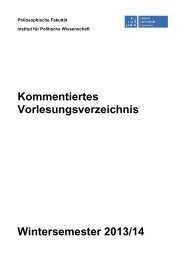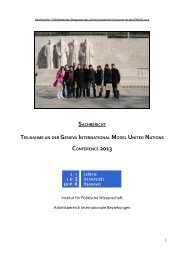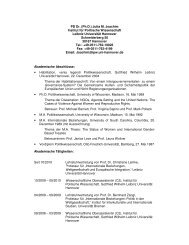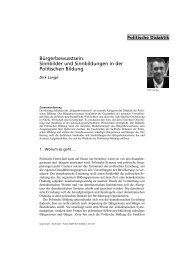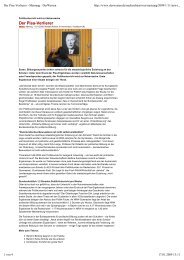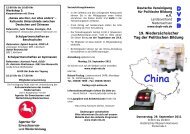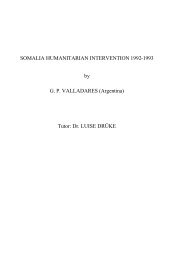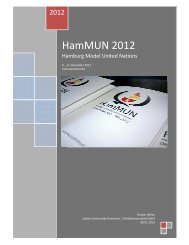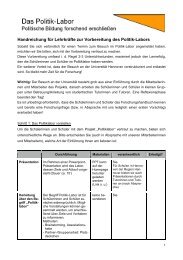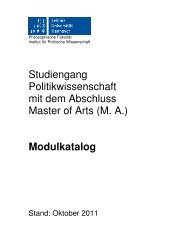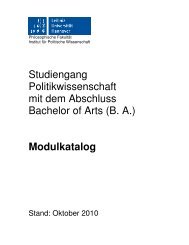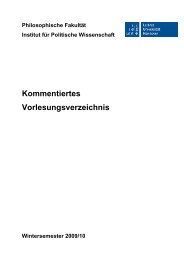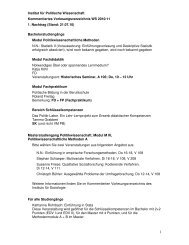Preventive Action for Refugee Producing Situations
Preventive Action for Refugee Producing Situations
Preventive Action for Refugee Producing Situations
You also want an ePaper? Increase the reach of your titles
YUMPU automatically turns print PDFs into web optimized ePapers that Google loves.
120 Chapter3<br />
the Miskitos, turning them into refugees in order to discredit and destabilize<br />
the Nicaraguan government It is no coincidence that these events occurred<br />
during the debate in the U.S. Congress over a $100 million aid package to the<br />
contras, with further funds earmarked <strong>for</strong> KISAN. 271<br />
Prevention of repatriation: The U.S. Administration anxious to obtain<br />
Congress approval <strong>for</strong> contra aid funding, considered voluntary repatriation to<br />
be politically counterproductive to its policy of "bashing the evil empire." 272<br />
So did KISAN and the Honduran military authorities, some of whom believed<br />
that voluntary repatriation would improve Nicaragua's image and bring anti-<br />
American elements back into the country. Voluntary repatriation, whether<br />
spontaneous or highly organized, wül depend on "whether the refugees are<br />
convinced that the causes of their flight have moderated sufficiently to promise<br />
a resumption of important aspects of their old lives." 273 That about half of the<br />
"new" refugees returned almost instantaneously to Nicaragua may be<br />
interpreted in two ways. First the people had had no major reason to leave their<br />
homes other than coercion (in addition to loosing their rice-crops); and second,<br />
the power of<br />
____________________<br />
271 The <strong>for</strong>ced movement suggested that the reconciliation process was working too<br />
well inside Nicaragua, and that external opposition was losing in its ef<strong>for</strong>ts to<br />
discredit the Nicaraguan government. "Disgracefully, they were aided in this<br />
ef<strong>for</strong>t by the United States." Martin Diskin et al., "Peace and Autonomy," p. 25.<br />
See also Steve Stecklow, "A Media Event - with no Audience," and "Caught up<br />
in Conflic, Indians Flee Nicaragua." "Why the Miskitos decided to seek refuge<br />
here is in dispute. One American official says that the tribe has become a<br />
'political football' in the ongoing struggle between the Sandinist government of<br />
Nicaragua and the contras." Philadelphia Inquirer, 6 April 1986.<br />
272 Diskin, "The Manipulation of Indigenous Struggles," p. 81. "The United States<br />
claimed that its support <strong>for</strong> anti-Sandinista <strong>for</strong>ces in the Atlantic Coast region<br />
was meant to help achieve Indian self-determination by the overthrow of<br />
Sandinistas" (p. 98) But by 1986, when the Atlantic Coast had acquired enormou<br />
significance in "Reagan's war against Nicaragua," because the major contra 1<br />
further to the west had failed militarily, there<strong>for</strong>e, even with an additional $10<br />
million voted by Congress, it became unlikely that summer, that the Contras in I<br />
west would be the route to overthrow the Nicaraguan government. A scenario of<br />
military penetration of the Atlantic Coast region seemed more likely to capture a<br />
larger community such as Puerta Cabeza and declare a provisional government<br />
through which to channel additional resources and perhaps U.S. troops. William<br />
Gasperini, "Miskitos Divided in Allegiances to Sandinistas and to Homeland," In<br />
These Times, 3-9 September 1986, pp. 8-9, as quoted in Diskin, "Manipulation of<br />
Indidigcnous Struggles," p. 92.<br />
273 Gordenker: <strong>Refugee</strong>s in International Politics. 1987, p. 127.<br />
Analytical Discussion 121<br />
coercion was short-lived enough so that as soon as they arrived in the<br />
Honduran camps, many refugees began the process of repatriation. 274<br />
Other scholars have found that "the opposing social <strong>for</strong>ces [in this case<br />
KISAN] also have <strong>for</strong>eign alignments, who often become the <strong>for</strong>emost<br />
patrons of the refugees. In conflicts that have led to huge outpourings of<br />
refugees, <strong>for</strong>eign involvement has been blatant, as in Afghanistan and<br />
Central America. " 275 It is clear that without strong <strong>for</strong>eign alignment and<br />
support, the Indian contra organizations would not have been able to<br />
maintain control over the people and keep them in <strong>for</strong>eign lands despite<br />
their wish to return home. Where control and pressure failed, KISAN used<br />
threats and distorted in<strong>for</strong>mation to prevent repatria tions. Human rights<br />
workers report that relief workers indicate having heard KISAN telling<br />
those who wanted to return that they would be killed if they went back to<br />
Nicaragua.<br />
As the Nicaraguan Miskitos won increased autonomy, the Indian contra<br />
organizations needed to exercise stronger pressures to prevent people from<br />
going home. The Miskitos' move toward self-determination started with the<br />
governmental autonomy commission, created in December 1984. The<br />
Nicaraguan Indian commander Eduardo Pantin, who was seeking a<br />
nonmilitary solution to the conflict, played an important role by bringing<br />
about the first draft of a proposed autonomy statute in June 1985, which,<br />
despite enormous obstructive ef<strong>for</strong>ts by the United States, the Nicaraguan<br />
government has incorporated into the 1987 constitution. 276 Moreover, the<br />
returnees, in approving current conditions in Nicaragua, are the bearers of<br />
good news to those remaining in Honduras, 277<br />
_________________<br />
274 Peplinski and Diskin, "Report of the ICVA Mosquitia Mission," 1987, p. 13.<br />
275 Zolberg et al., Escape from Violence; Draft, Forthcoming; Ox<strong>for</strong>d University<br />
Press, 1989, Chapter 10, p. 14.<br />
276 See Comisión National de Autonomía de la Costa Atlantica, Principios y<br />
Políti-cas Para el Ejercício de los Derechos de Autonomía de los Pueblos<br />
Indígenas y Comunidades de la Costa Atlantica (Managua: Comision National<br />
de Autonomia de la Costa Atlantica, 1985); and Chapter VI, articles 89,90,91,<br />
Republica de Nicaragua, "Constitutión Política," La Gazeta Diario Oficial<br />
(Managua), January 9, 1987, pp. 46, 47, as quoted in Diskin, "The<br />
Manipulation of Indigenous Struggles," pp. 95,96.<br />
277 The International Committee of the Red Cross has been operating a mailing<br />
system by which the refugees in Honduras were enabled to exchange messages<br />
safely with relatives in the Nicaraguan Mosquitia. This has been an important<br />
relief and support measure <strong>for</strong> the refugees.



